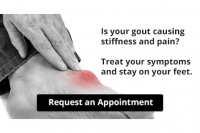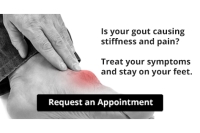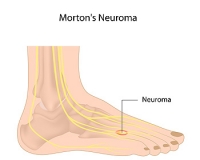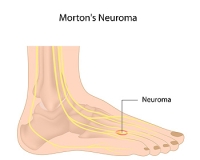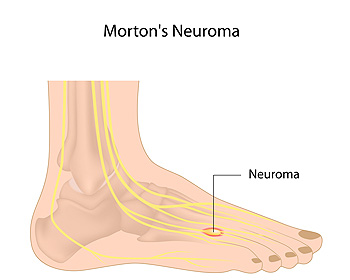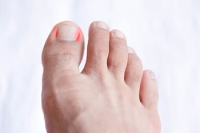
Blog (791)
Gout Pain Can Be Managed
Gout Pain Can Be Managed
Understanding Morton’s Neuroma
A neuroma is a condition where the tissue that surrounds a nerve becomes thickened and inflamed. A neuroma can materialize around any nerve of the body, but when it occurs between the 3rd and 4th toes (or less commonly the 2nd and 3rd toes), it is known as Morton’s Neuroma. This benign growth of nerve cells can cause tingling, pain, and numbness in the ball of the foot—often making it feel as if there is a pebble stuck in your shoe. It is suggested that you see a podiatrist if you suspect you have Mortaon’s neuroma, as the condition may worsen and possibly lead to permanent nerve damage.
Morton’s neuroma is a very uncomfortable condition to live with. If you think you have Morton’s neuroma, contact Dr. Kenneth Donovan of Advanced Care Foot and Ankle. Our doctor will attend to all of your foot care needs and answer any of your related questions.
Morton’s Neuroma
Morton's neuroma is a painful foot condition that commonly affects the areas between the second and third or third and fourth toe, although other areas of the foot are also susceptible. Morton’s neuroma is caused by an inflamed nerve in the foot that is being squeezed and aggravated by surrounding bones.
What Increases the Chances of Having Morton’s Neuroma?
- Ill-fitting high heels or shoes that add pressure to the toe or foot
- Jogging, running or any sport that involves constant impact to the foot
- Flat feet, bunions, and any other foot deformities
Morton’s neuroma is a very treatable condition. Orthotics and shoe inserts can often be used to alleviate the pain on the forefront of the feet. In more severe cases, corticosteroids can also be prescribed. In order to figure out the best treatment for your neuroma, it’s recommended to seek the care of a podiatrist who can diagnose your condition and provide different treatment options.
If you have any questions, please feel free to contact one of our offices located in Warren, Livingston, and Toms River, NJ . We offer the newest diagnostic and treatment technologies for all your foot care needs.
Understanding Morton’s Neuroma
A neuroma is a condition where the tissue that surrounds a nerve becomes thickened and inflamed. A neuroma can materialize around any nerve of the body, but when it occurs between the 3rd and 4th toes (or less commonly the 2nd and 3rd toes), it is known as Morton’s Neuroma. This benign growth of nerve cells can cause tingling, pain, and numbness in the ball of the foot—often making it feel as if there is a pebble stuck in your shoe. It is suggested that you see a podiatrist if you suspect you have Mortaon’s neuroma, as the condition may worsen and possibly lead to permanent nerve damage.
Morton’s neuroma is a very uncomfortable condition to live with. If you think you have Morton’s neuroma, contact Dr. Kenneth Donovan of Advanced Care Foot and Ankle. Our doctor will attend to all of your foot care needs and answer any of your related questions.
Morton’s Neuroma
Morton's neuroma is a painful foot condition that commonly affects the areas between the second and third or third and fourth toe, although other areas of the foot are also susceptible. Morton’s neuroma is caused by an inflamed nerve in the foot that is being squeezed and aggravated by surrounding bones.
What Increases the Chances of Having Morton’s Neuroma?
- Ill-fitting high heels or shoes that add pressure to the toe or foot
- Jogging, running or any sport that involves constant impact to the foot
- Flat feet, bunions, and any other foot deformities
Morton’s neuroma is a very treatable condition. Orthotics and shoe inserts can often be used to alleviate the pain on the forefront of the feet. In more severe cases, corticosteroids can also be prescribed. In order to figure out the best treatment for your neuroma, it’s recommended to seek the care of a podiatrist who can diagnose your condition and provide different treatment options.
If you have any questions, please feel free to contact one of our offices located in Warren, Livingston, and Toms River, NJ . We offer the newest diagnostic and treatment technologies for all your foot care needs.
The Development of an Ingrown Toenail
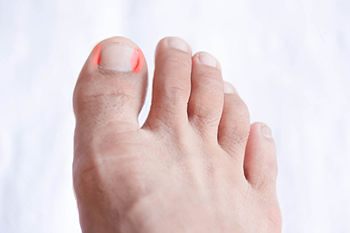 An ingrown toenail occurs when the toenail grows into the skin surrounding it. It can cause extreme pain and discomfort, and it can happen from cutting the toenails incorrectly. Noticeable symptoms can include redness, tenderness, and pus may drain from an infected toenail. Incurring a toenail injury, poor foot hygiene, or genetic factors may significantly contribute to developing an ingrown toenail. There are some patients who find mild relief when the affected foot is soaked, and this may make it easier to gently pull the skin away from the nail. Additionally, soaking the feet in epsom salt may help to reduce existing inflammation. If you have symptoms of an ingrown toenail, please schedule an appointment with a podiatrist who can effectively treat this uncomfortable condition.
An ingrown toenail occurs when the toenail grows into the skin surrounding it. It can cause extreme pain and discomfort, and it can happen from cutting the toenails incorrectly. Noticeable symptoms can include redness, tenderness, and pus may drain from an infected toenail. Incurring a toenail injury, poor foot hygiene, or genetic factors may significantly contribute to developing an ingrown toenail. There are some patients who find mild relief when the affected foot is soaked, and this may make it easier to gently pull the skin away from the nail. Additionally, soaking the feet in epsom salt may help to reduce existing inflammation. If you have symptoms of an ingrown toenail, please schedule an appointment with a podiatrist who can effectively treat this uncomfortable condition.
Ingrown toenails may initially present themselves as a minor discomfort, but they may progress into an infection in the skin without proper treatment. For more information about ingrown toenails, contact Dr. Kenneth Donovan of Advanced Care Foot and Ankle. Our doctor can provide the care you need to keep you pain-free and on your feet.
Ingrown Toenails
Ingrown toenails are caused when the corner or side of a toenail grows into the soft flesh surrounding it. They often result in redness, swelling, pain, and in some cases, infection. This condition typically affects the big toe and may recur if it is not treated properly.
Causes
- Improper toenail trimming
- Genetics
- Improper shoe fitting
- Injury from pedicures or nail picking
- Abnormal gait
- Poor hygiene
You are more likely to develop an ingrown toenail if you are obese, have diabetes, arthritis, or have any fungal infection in your nails. Additionally, people who have foot or toe deformities are at a higher risk of developing an ingrown toenail.
Symptoms
Some symptoms of ingrown toenails are redness, swelling, and pain. In rare cases, there may be a yellowish drainage coming from the nail.
Treatment
Ignoring an ingrown toenail can have serious complications. Infections of the nail border can progress to a deeper soft-tissue infection, which can then turn into a bone infection. You should always speak with your podiatrist if you suspect you have an ingrown toenail, especially if you have diabetes or poor circulation.
If you have any questions, please feel free to contact one of our offices located in Warren, Livingston, and Toms River, NJ . We offer the newest diagnostic and treatment technologies for all your foot care needs.
Uncomfortable Swollen Feet During Pregnancy
 One of the most common complaints pregnant women have is swollen feet, and they can generally begin to feel uncomfortable as the pregnancy progresses. This can happen as a result of the growing fetus which can put pressure on specific areas of the body, and it can occur from an increase in fluids and blood. Many women have found mild relief when they can frequently elevate their feet, and it may help to perform gentle foot stretches throughout the day. Additionally, it is beneficial to limit sodium intake, and wearing compression stockings may help with persistent swelling. If you are pregnant, and would like more information about why your feet are swollen and additional relief methods, please consult with a podiatrist.
One of the most common complaints pregnant women have is swollen feet, and they can generally begin to feel uncomfortable as the pregnancy progresses. This can happen as a result of the growing fetus which can put pressure on specific areas of the body, and it can occur from an increase in fluids and blood. Many women have found mild relief when they can frequently elevate their feet, and it may help to perform gentle foot stretches throughout the day. Additionally, it is beneficial to limit sodium intake, and wearing compression stockings may help with persistent swelling. If you are pregnant, and would like more information about why your feet are swollen and additional relief methods, please consult with a podiatrist.
Pregnant women with swollen feet can be treated with a variety of different methods that are readily available. For more information about other cures for swollen feet during pregnancy, consult with Dr. Kenneth Donovan from Advanced Care Foot and Ankle. Our doctor will attend to all of your foot and ankle needs.
What Foot Problems Can Arise During Pregnancy?
One problem that can occur is overpronation, which occurs when the arch of the foot flattens and tends to roll inward. This can cause pain and discomfort in your heels while you’re walking or even just standing up, trying to support your baby.
Another problem is edema, or swelling in the extremities. This often affects the feet during pregnancy but tends to occur in the later stages.
How Can I Keep My Feet Healthy During Pregnancy?
- Wearing orthotics can provide extra support for the feet and help distribute weight evenly
- Minimize the amount of time spent walking barefoot
- Wear shoes with good arch support
- Wear shoes that allow for good circulation to the feet
- Elevate feet if you experience swelling
- Massage your feet
- Get regular, light exercise, such as walking, to promote blood circulation to the feet
If you have any questions please feel free to contact one of our offices located in Warren, Livingston, and Toms River, NJ . We offer the newest diagnostic and treatment technologies for all your foot and ankle needs.
Are Bunions Affecting Your Everyday Life?
Are Bunions Affecting Your Everyday Life?
Several Types of Foot Pain
 There are several different types of foot pain that exist. An ankle impingement can occur as a result of repetitive movement or from a sudden injury. This condition may have the same symptoms of an ankle sprain, and it may cause difficulty in walking. Children may experience heel pain, which may be indicative of Sever’s disease. This is an ailment that affects the growth plate in the heel, and the pain may be severe when pressure is put on the heel. A common form of foot pain is known as plantar fasciitis, and this occurs when the plantar fascia becomes inflamed. The plantar fascia is a band of tissue that is found on the bottom of the foot, and it connects the heel to the toes. This condition can happen from wearing shoes that do not fit correctly, or from standing on hard surfaces for the majority of the day. If you have any type of foot pain, it is strongly suggested that you are under the care of a podiatrist who can diagnose and treat foot disorders.
There are several different types of foot pain that exist. An ankle impingement can occur as a result of repetitive movement or from a sudden injury. This condition may have the same symptoms of an ankle sprain, and it may cause difficulty in walking. Children may experience heel pain, which may be indicative of Sever’s disease. This is an ailment that affects the growth plate in the heel, and the pain may be severe when pressure is put on the heel. A common form of foot pain is known as plantar fasciitis, and this occurs when the plantar fascia becomes inflamed. The plantar fascia is a band of tissue that is found on the bottom of the foot, and it connects the heel to the toes. This condition can happen from wearing shoes that do not fit correctly, or from standing on hard surfaces for the majority of the day. If you have any type of foot pain, it is strongly suggested that you are under the care of a podiatrist who can diagnose and treat foot disorders.
Foot Pain
Foot pain can be extremely painful and debilitating. If you have a foot pain, consult with Dr. Kenneth Donovan from Advanced Care Foot and Ankle. Our doctor will assess your condition and provide you with quality foot and ankle treatment.
Causes
Foot pain is a very broad condition that could be caused by one or more ailments. The most common include:
- Bunions
- Hammertoes
- Plantar Fasciitis
- Bone Spurs
- Corns
- Tarsal Tunnel Syndrome
- Ingrown Toenails
- Arthritis (such as Gout, Rheumatoid, and Osteoarthritis)
- Flat Feet
- Injury (from stress fractures, broken toe, foot, ankle, Achilles tendon ruptures, and sprains)
- And more
Diagnosis
To figure out the cause of foot pain, podiatrists utilize several different methods. This can range from simple visual inspections and sensation tests to X-rays and MRI scans. Prior medical history, family medical history, and any recent physical traumatic events will all be taken into consideration for a proper diagnosis.
Treatment
Treatment depends upon the cause of the foot pain. Whether it is resting, staying off the foot, or having surgery; podiatrists have a number of treatment options available for foot pain.
If you have any questions, please feel free to contact one of our offices located in Warren, Livingston, and Toms River, NJ . We offer the newest diagnostic and treatment technologies for all your foot care needs.
How to Buy Golf Shoes That Fit Correctly
People who enjoy playing golf are often unaware of the importance of wearing the right golf shoes. The wrong shoes can hurt their feet, in addition to negatively affecting their game. Many players are concerned with choosing the right golf clubs, and can often overlook the attention that is needed to choose the right shoes. This can be remedied by measuring the feet using the Brannock device, and it is suggested that you wear the socks that will be worn while playing golf. It is beneficial to wear golf shoes that are wide, as this allows ample room for the toes to move freely. If you would like additional information about how to buy golf shoes that can enhance your game and fit correctly, please consult with a podiatrist.
Finding a properly-fitting shoe is important in reducing injuries and preventing foot problems. For more information about treatment, contact Dr. Kenneth Donovan from Advanced Care Foot and Ankle. Our doctor will treat your foot and ankle needs.
Proper Shoe Fitting
A common concern when it comes to foot health, having properly fitted shoes can help prevent injuries to the foot. Out feet affect our posture and gait, which in turn affects the biomechanics and overall bodily structure. With 33 joints, 26 bones, and over 100 ligaments, the potential for serious injury is much greater than one realizes. Although the feet cease growth in adulthood, they still change shape as they mature. Here are some factors to consider when it comes to investing in proper fitting shoes:
- Be sure the shoes fit correctly right away
- Ensure the ball of your foot fits comfortably in the widest portion of the shoes
- Even though they may look fashionable, improper fitting shoes can either create adverse conditions or exacerbate existing ones you may already have
- Walk along a carpeted surface to ensure the shoes comfortably fit during normal activity
Keeping in mind how shoes fit the biomechanics of your body, properly-fitting shoes are vitally important. Fortunately, it is not difficult to acquire footwear that fits correctly. Be sure to wear shoes that support the overall structure of your body. Do your feet a favor and invest in several pairs of well-fitted shoes today.
If you have any questions please feel free to contact one of our offices located in Warren, Livingston, and Toms River, NJ . We offer the newest diagnostic and treatment technologies for all your foot and ankle needs.
